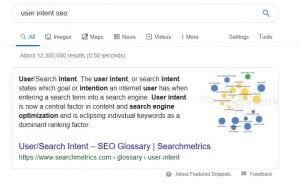Are you concerned with your website’s positioning on the search engine results pages (SERPs)? If you answered yes, then you need to work on your on-page SEO.

What is On-Page SEO
The job of a search engine is to connect a user to the content they are looking for. Returning the right websites to a user is big business, so a lot of work goes into getting the programming just right. The algorithms used are continually being updated and the criteria used in these calculations are highly guarded secrets.
But how do search engines know if a website has the information a user is looking for? The answer, in-part, is on-page SEO. This SEO technique optimizes both a page’s content and its HTML source code to make the website as discoverable as possible.
Once a website has been discovered by a search engine, its structure and content are evaluated. Sites that are easily navigable and contain quality content receive favorable evaluations and are placed higher on the SERPs than sites that don’t measure up. And at the end of the day, you want your site to be as close to the top of page one as possible in order to get substantial site traffic.
At the end of the day, you want your site to be as close to the top of page one as possible in order to get substantial site traffic. Click To Tweet
How To Improve A Site’s On-Site SEO
1. Optimize URLs
One of the first things you can do to improve your on-site SEO is to optimize the URL for each of your webpages.
Each webpage’s URL (also known as a slug) should be short, descriptive and contain the target keyword.
Here is an example of a bad URL:
www.yourdomain.com/37873/publish/p?639
Here is an example of a good URL
www.yourdomain.com/seo-optimization
2. Optimize for a Featured Snippet
Have you ever typed something into a search engine and had a helpful box appear that contains a quick answer to your query? It might have looked something like this:

That is called a featured snippet and it can build your domain authority as well as drive traffic directly to your site.
3. Keyword usage
The purpose behind using keywords is to help search engines figure out what your webpage is about. You can make this process easier on the search engine bots by optimizing your use of keywords.
One way to do this is to use your target keywords within the first 100-150 words of your article. By using the keywords early on, search engines have an easier time figuring out what your page is about.
Another key action is to include keywords in sub-headings. This helps to reinforce the subject matter content for search engines.
4. Link Building Improves On-Page SEO
In the world of websites, a website is nobody until it’s linked to something else. This means that it’s very unlikely that a website will be discovered by search engines if it exists all by itself. Links are how a website becomes known and the more links you have, the more weight your site will have.
It’s important to include both external links and internal links on your webpages. What this signals to the search engines is that your website is a hub for quality information and that it should be given more weight than those that don’t contain as much information.
But be cautious. In this case, you are who you associate with. If you link to other quality sites, your site will also be seen as a quality site and will be treated as such. However, if you instead link to spammy or unrelated sites just for the chance to make a link, search engines will penalize you.
5. Optimize Meta Descriptions
When websites are returned on the SERP, the website’s name, URL and a short description are displayed. The short description is called a meta description and it can play a big part in your on-page SEO.
Not only do these 160 characters work to convince users to click on a URL, but they also help show search engines what the page is about. This is why it is important to include target keywords in the meta descriptions.
6. Speed Counts for On-Page SEO
When you are reviewing sites to find the information you are looking for, do you wait for slow sites to load? Probably not, and chances are you don’t give them a second chance either.
Well, it turns out that you aren’t alone. A study by Akamai found that 75% of people would not return to a website if it took longer than 4 seconds to load.
You don’t want this to happen to your site. Not only does it slow the amount of traffic you could be receiving, but it also affects your bounce rate. If you have a lot of people clicking on your site and then leaving right away, search engines will interpret these actions as your site not being what users are looking for. Therefore, they will rank it lower on the SERP.
Final Thoughts
If you want to appear on page one of the SERPs, you need to work on your on-page SEO. This technique is geared to get your site discovered by search engines, which in turn will drive more traffic to your site.
———-
In plain terms, WordPress (WP) is simply the top free platform upon which one can create
fantastic fully-featured websites or blogs of any size (best among both free or paid solutions).
Learn more about WordPress here.
***Gain more insight about how to install WordPress & your options.***
If you would like to consider working with us on our Premium or Standard Plans on a ongoing monthly basis, then we can do the job FREE as a trial (with no credit card required and assumes you have a interest potentially becoming a Standard or Premium Plan member . . . otherwise, please use the single one-off job option below).
See here: https://www.wpwebsitehelp.com/#plansandpricing
OR
2. If you only need us to do this one job only, then checkout here for this one-off single job.
See here: https://www.wpwebsitehelp.com/single-one-job/
Our plans can cover ongoing maintenance & annoying regular task items, of which, you should not spend your valuable time! This gives you peace of mind so you can focus your mind on your endeavor. We have you covered whether it is WordPress help or WordPress support for a business, personal, student, education, non-profit, or ministry endeavor.
Here are some examples along with HOW it works at WP Website Help.
Here are a few FAQ’s & our about us.
Jolene is a strong operations, compliance, and paralegal manager. She also loves to research and write about business as well as personal topics that help others.
Jolene @ The WP Website Help Team

